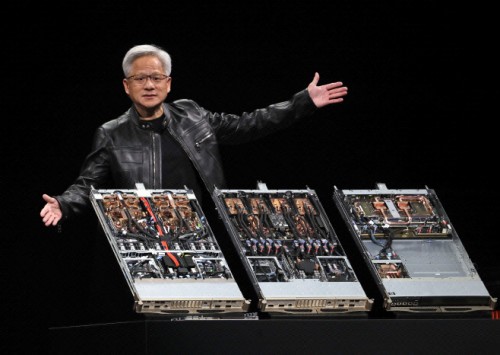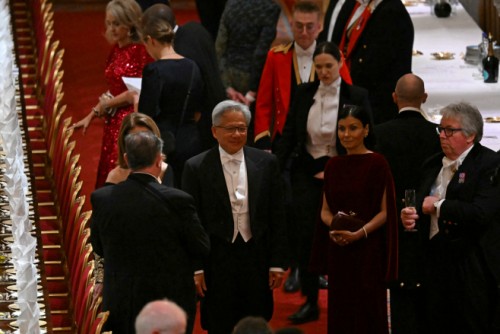 |
| Nvidia CEO Jensen Huang delivers a keynote address at Computex Taipei 2025 on May 19. / Source: AP-Yonhap |
China has ordered its tech companies to stop using Nvidia’s latest artificial intelligence (AI) chips, a move analysts say reflects both security concerns and growing confidence in domestic chipmaking capabilities, the Financial Times reported on September 17.
According to the FT, the Cyberspace Administration of China (CAC) told ByteDance, the parent company of TikTok, as well as Alibaba and other firms, to halt testing and orders of Nvidia’s new China-specific chip, the RTX 6000D, designed for AI inference. Several firms had begun validation work after planning to buy tens of thousands of units, but these efforts stopped following CAC’s directive.
The ban goes beyond earlier restrictions targeting Nvidia’s H20 chip, which Chinese authorities had discouraged companies—particularly state-owned enterprises—from using in government and security-related projects. Bloomberg and Reuters reported last month that Beijing had already pressured firms to avoid the H20.
 |
| Nvidia CEO Jensen Huang attends a state banquet with U.S. President Donald Trump at Windsor Castle, England, on September 17. / Source: Reuters-Yonhap |
Analysts say the move aims to reduce reliance on Nvidia while supporting China’s push to compete with the U.S. in AI development. Reuters noted that the RTX 6000D has underperformed compared with Nvidia’s RTX 5090 in sample testing, partly because it uses conventional GDDR memory instead of high-bandwidth memory (HBM).
Nvidia CEO Jensen Huang, attending a state banquet in Britain alongside U.S. President Donald Trump, expressed disappointment but said, “We can only provide services in markets where we are wanted. There are bigger issues between the U.S. and China, and we remain patient.” Nvidia’s shares fell 2.62% to $170.29 on the New York Stock Exchange following the report.
Meanwhile, Bloomberg said Alibaba’s semiconductor arm has begun supplying custom AI accelerators to China Unicom, the nation’s second-largest telecom operator, in a move to lessen dependence on foreign suppliers.
Separately, the FT reported that Semiconductor Manufacturing International Corp. (SMIC), China’s largest chipmaker, has started testing advanced deep ultraviolet (DUV) lithography equipment developed by Shanghai-based startup Yuliangsheng. If successful, SMIC could use multi-patterning techniques to produce chips as small as 7 nanometers, despite U.S. restrictions on extreme ultraviolet (EUV) tools made by Dutch firm ASML.
Industry experts say such breakthroughs could help China narrow the gap with Taiwan’s TSMC, which already mass-produces cutting-edge 2nm chips using EUV lithography.
Most Read
-
1
-
2
-
3
-
4
-
5
-
6
-
7





















